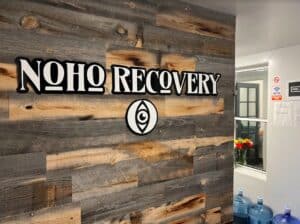Marijuana Withdrawal And Detox
Understanding Marijuana Withdrawal
Like other addictive substances, heavy or prolonged Marijuana use can increase a person’s risk of withdrawal when stopping. While Marijuana withdrawal isn’t as dangerous as harder drugs like Cocaine or Heroin, many users still face withdrawal symptoms when trying to quit. Some people have related Marijuana withdrawal to the experience of quitting caffeine; feeling edgy, irritable, or otherwise “off,” with occasional headaches and nausea.
The symptoms of withdrawal from Marijuana vary between each user. Some people with mild Marijuana dependencies are able to stop on their own. However, chronic users who have built up a tolerance might need more help kicking their habit. Ultimately, it depends on the individual, the frequency, and the strain/potency of the Marijuana they’re consuming.
If you’ve struggled to quit using Marijuana on your own, a medical detox program may be the answer you’re looking for.
Online Marijuana Addiction Counseling

Get professional help from an addiction and mental health counselor from BetterHelp by phone, video, or live-chat.
Take the Quiz. Get Matched. Begin Therapy.

Online therapy can help you with long term addiction support. Connect with a therapist from Talkspace anytime, anywhere.
Get matched with a therapist now.
Paid Advertising. We may receive advertising fees if you follow links to promoted online therapy websites.
Do I Need Detox For Marijuana Withdrawal?
Withdrawal from Marijuana can be uncomfortable, especially for chronic users. A medically supervised detox is especially recommended for those who have co-occurring disorders: like a mental health condition or an addiction to other drugs. In particular, dependencies on other substances such as Benzodiazepines or alcohol can exacerbate the symptoms a person experiences during Marijuana withdrawal.
Other reasons for choosing a detox program include:
-
Desiring help for a pre-existing mental health condition
Many people use Marijuana to self-medicate a mental health problem. Medical detox sets the groundwork for treating the Marijuana addiction alongside an underlying co-occurring disorder.
-
Making multiple attempts to quit Marijuana but being unable to do so
Some habits die hard, and Marijuana is no exception. The uncomfortable withdrawal symptoms associated with Marijuana make it difficult to quit without the help of medical professionals.
-
Not living in a stable, substance-free environment
If your living situation encourages substance use, overcoming your Marijuana addiction might feel impossible. Sobering up in a detox program can provide a safe and comforting home away from home.
Fortunately, there are numerous inpatient and outpatient treatment centers that offer in-house Marijuana detox services. Browse a rehab directory here.

Break free from addiction.
You have options. Talk about them with a treatment provider today.
Marijuana Withdrawal Symptoms
Symptoms of withdrawing from Marijuana vary according to an individual’s level of dependency. For example, a person with a mild dependence on Marijuana may experience minor physical and psychological discomfort, such as headaches or restlessness. On the other hand, those with severe forms of Marijuana addiction may endure more intense withdrawal symptoms, including sweating, fever, chills, and hallucinations. In general, the longer the individual has used Marijuana, the more severe their symptoms will be. Luckily, in most cases Marijuana withdrawal symptoms will largely subside within 2-3 weeks.
The most common symptoms include:
- Anxiety
- Depression
- Agitation
- Irritability
- Headaches
- Restlessness
- Stomach pains
- Appetite loss/weight loss
- Nausea
- Insomnia or fatigue
Some of this side effects may exacerbate each other; for instance, anxiety may contribute to depression. Appetite loss might result in irritability as one struggles to eat, and restlessness and sleeplessness may cause increased agitation.
Looking for a place to start?
Join the thousands of people that have called a treatment provider for rehab information.
Free and confidential
Available 24/7
Access to professional treatment
Detox Options For Marijuana
Medical detox is designed to help people slowly ease off of a substance until it’s completely cleared from their system. This helps to reduce the intensity of any withdrawal symptoms they might have. Once withdrawal symptoms improve, a medical team will walk patients through any additional treatments they might need. Many people opt to continue recovering at a rehab center so they’ll have the highest chance of staying sober and avoiding relapse.
In cases where the patient resides in a state where Marijuana is legal and possesses a prescription, doctors may use a tapering down method to help users overcome withdrawal symptoms. This method involves reducing the amount and frequency of Marijuana used over a period of time. Tapering off the drug allows the brain to slowly adjust to lower levels of THC, resulting in less intense withdrawal symptoms. In most circumstances, however, use of Marijuana is ceased immediately upon entering detox, and non-Narcotic comfort medications are provided.
While many are able to safely detox from Marijuana on their own, doctors are able to prescribe medications to help reduce withdrawal symptoms. For example, Metoclopramide or Promethazine can help with nausea and vomiting. Headaches or muscle pains can be treated with Paracetamol or Ibuprofen. It is important to consult a doctor about how to best treat withdrawal symptoms.
Check if my insurance covers rehab
Addiction Center is not affiliated with any insurance.
How Long Does Marijuana Withdrawal Last?
The duration of withdrawal from Marijuana is different for everyone. For most heavy Marijuana users, withdrawal symptoms begin on the first day after quitting and peak within 48 to 72 hours. Symptoms generally last 2 to 3 weeks and dissipate over time.
| Marijuana Withdrawal Timeline | |
|---|---|
| Day 1 | During the first day of withdrawal from Marijuana, feelings such as irritability, anxiety, and insomnia are common. |
| Days 2 – 3 | This period is typically the peak of withdrawal symptoms. Cravings can be strong, so relapse is most likely during this time. Sweating, chills, and stomach pains have also been reported during this period. |
| Days 4 – 14 | Over the next several weeks, symptoms generally improve. However, depression can set in as brain chemistry changes and adapts to functioning without THC. Marijuana cravings may still be present as well. |
| Days 15+ | Most, if not all, symptoms should be gone by week 3. Those with severe psychological addictions have reported feelings of depression and anxiety for up to several months after discontinuing Marijuana use. |
Treating A Marijuana Addiction
After safely detoxing with the help of medical professionals, a person with a psychological dependence on Marijuana should seek further treatment at a rehab center and/or attend a support group such as Marijuana Anonymous.
An outpatient program is best suited for those with milder forms of Marijuana dependence, while inpatient programs are recommended for more severe addictions. Outpatient programs are available to those who wish to remain at home during treatment but also want the help and advice of professionals as they pursue recovery. Inpatient programs provide a high level of care in a structured environment, allowing people to focus solely on their treatment and recovery.
If you or a loved one is ready to shed a Marijuana addiction, the time to act is now. Contact a treatment provider today.
Overcome Marijuana Addiction

Get professional help from an addiction and mental health counselor from BetterHelp by phone, video, or live-chat.
Take the Quiz. Get Matched. Begin Therapy.

Online therapy can help you with long term addiction support. Connect with a therapist from Talkspace anytime, anywhere.
Get matched with a therapist now.

Begin making positive changes with Online-Therapy.com. Quality online therapy, from the comfort of home.
Answer a few questions to get started.
Paid Advertising. We may receive advertising fees if you follow links to promoted online therapy websites.
Published:
Author
Jeffrey Juergens

-
Jeffrey Juergens earned his Bachelor’s and Juris Doctor from the University of Florida. Jeffrey’s desire to help others led him to focus on economic and social development and policy making. After graduation, he decided to pursue his passion of writing and editing. Jeffrey’s mission is to educate and inform the public on addiction issues and help those in need of treatment find the best option for them.
- More from Jeffrey Juergens
Reviewed by Certified Addiction Professional:
Theresa Parisi

Theresa Parisi is a Certified Addiction Professional (CAP), Certified Behavioral Health Case Manager (CBHCM), and International Certified Alcohol and Drug Counselor (ICADC) with over 12 years of experience in the addiction treatment field.
- More from Theresa Parisi
Sources


Recovery Starts Today
Call Now For Addiction Support

Newport Institute for Young Adults
Sunol , CA

The Camp Recovery Center
Scotts Valley , CA

Bayside Marin Treatment Center
San Rafael , CA






Hollywood Hills Recovery
Los Angelos , CA



Gratitude Lodge Drug & Alcohol Rehab
Long Beach , CA

Asana Recovery – Outpatient Treatment Center
Fountain Valley , CA

Renaissance Recovery
Fountain Valley , CA

The District Recovery Community
Huntington Beach , CA

California Prime Recovery
Fountain Valley , CA